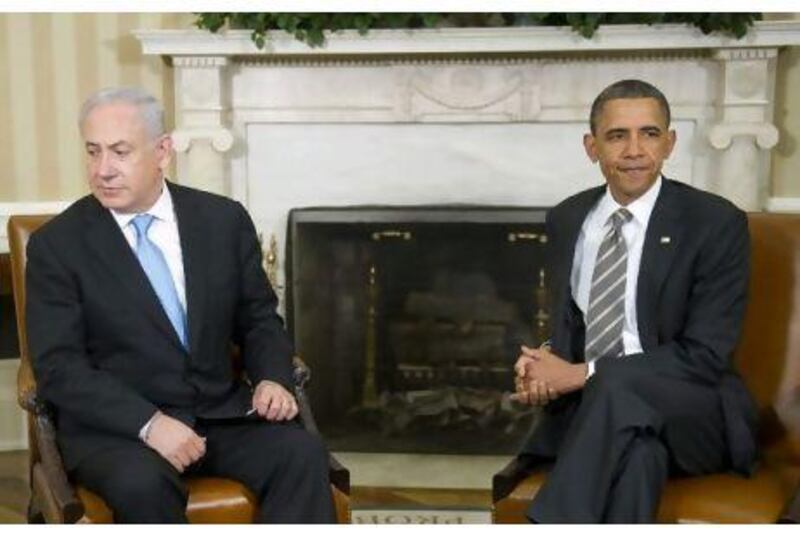WASHINGTON // Relations between the US and Israel remained at the lowest point in years yesterday after talks in the White House, setting up a tense few days ahead for the longtime allies.
Barack Obama, the US president, and Benjamin Netanyahu, the Israeli prime minister, conceded there were differences in their positions on how to resolve the Palestinian-Israeli conflict.
Both men smiled as they faced reporters, and Mr Obama tried to paint their differences as a disagreement "between friends". But their meeting was almost certainly fractious after the Israeli leader had tersely rejected the US president's assertion on Thursday that any Palestinian-Israeli borders should be based on the pre-1967 armistice lines.
Mr Netanyahu will now prepare to outline his government's objections to Mr Obama's stated positions at a speech at the American-Israel Political Affairs Committee, Aipac, tomorrow night as well as in an address he is to deliver before the US Congress on Monday. For all Israel's outrage at Mr Obama's position on borders, and while this was the first time Mr Obama sketched out in public a partial blueprint for a solution to the Palestinian-Israeli conflict, Mr Obama's speech on Thursday did not stray an inch from accepted Washington orthodoxy.
"There's nothing really avant-garde about it," said Steven Clemons, of the New America Foundation, a Washington think tank. "What is avant-garde is that the president put his name to it. It's an important step forward."
The American president suggested that borders should be agreed first, based on the 1967 lines, to give Palestinians a territorial sense of their future. A phased withdrawal of Israeli forces from occupied territory would give Israelis a chance to adjust their military positions and Palestinians the time to prove they are committed to ensuring Israel's security. Only after that would the "wrenching" issues of Jerusalem and Palestinian refugees be tackled.
The president, perhaps wisely, did not try to explain how borders could be decided without addressing the issue of Jerusalem. Neither did he give any new sense of how the "effectiveness of security arrangements" would be judged or by whom.
In fact, Mr Obama's suggestions are all contained in the 2003 road map plan for peace, signed by both Israel and the Palestinians. The road map was based on the recommendations of George Mitchell, Mr Obama's Middle East peace envoy until he resigned last week, after two years of busy but ultimately fruitless diplomacy.
A restatement of the road map, even if it is the first time by Mr Obama, was unlikely to impress anyone, said Diana Buttu, a Palestinian analyst in Boston.
"There was nothing new [in the speech], it doesn't mean anything and it won't change anything."
The speech, she said, was a step back for Palestinian aspirations. There was no mention of settlements, she noted, and Mr Obama urged Palestinians to recognise Israel without making such recognition mutual, as he did in Cairo two years ago.
Israel's reaction, which she described as "hysteria", was evidence that aside from giving Israel carte blanche in the occupied territories, "there would have been nothing he could have said that would have pleased the Israelis. But he could have said that he would enforce agreements, and that would have pleased the Palestinian side at least".
Nevertheless, Mr Clemons said the speech was a positive step. Likening it to a boxing match, in which Mr Netanyahu has "been beating the crap out of Obama for 15 rounds", Mr Clemons said Mr Obama had shown he was still in the fight.
"Obama is refusing to forfeit the field to Netanyahu. That's the context and that's important."
The tensions are likely to be felt keenly in the next several days in Washington. Mr Netanyahu is likely to face a friendly audience at Congress on Monday where he will address US legislators after soliciting an invitation from John Boehner, the Republican House speaker in March.
Israel garners near-total bipartisan support in Congress, not least due to the efforts of very effective pro-Israel lobbying groups, the most significant of which is Aipac, where Mr Obama will also speak tomorrow.
There the US president is likely to face a far more hostile crowd.
After Mr Obama's speech on Thursday, the Aipac President Lee Rosenberg sent out e-mails to delegates not to boo the president during his speech. "We ask that you act and react to every speech, address, and briefing that will be offered as part of the conference programme in only the most positive manner," Mr Rosenberg wrote.
Mr Obama is set to underline, yet again, America's "unshakeable bond" with Israel during the speech but is not otherwise
expected to make any major policy announcements. Mr Clemons, however, cautioned that Mr Obama has a tendency to "say something really great … and then walk it back".
For the first time, Aipac will not hold its conference uncontested. A countermovement, Move Over Aipac, is organising its first
conference concurrently in an attempt to "wean US policy away from Aipac's grip", according to Medea Benjamin, one of the organisers.
"Right now US policy is written by Aipac, includes unconditional support for Israel and is a barrier to a just solution," Ms Benjamin said at a demonstration outside the White House yesterday.
Some 100 activists had turned up to protest Mr Netanyahu's meeting with Mr Obama. "Tax dollars for jobs and schools, not
apartheid," read one placard. "Stop US military aid for Israeli war crimes," read another.
Five pro-Israel demonstrators with Israeli and American flags had taken up an opposite position.
"Thank God for democracy", scoffed one of them, a man holding a sign that read, "Support Israel, Destroy Hamas", which won the last Palestinian parliamentary elections in 2006.
okarmi@thenational.ae





